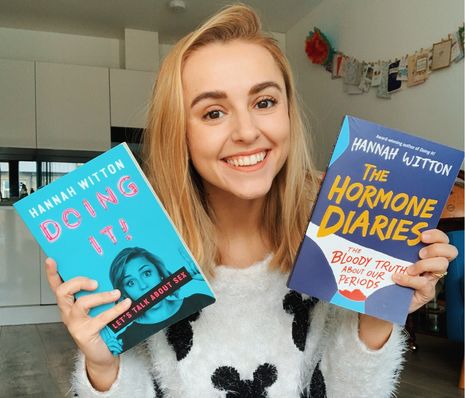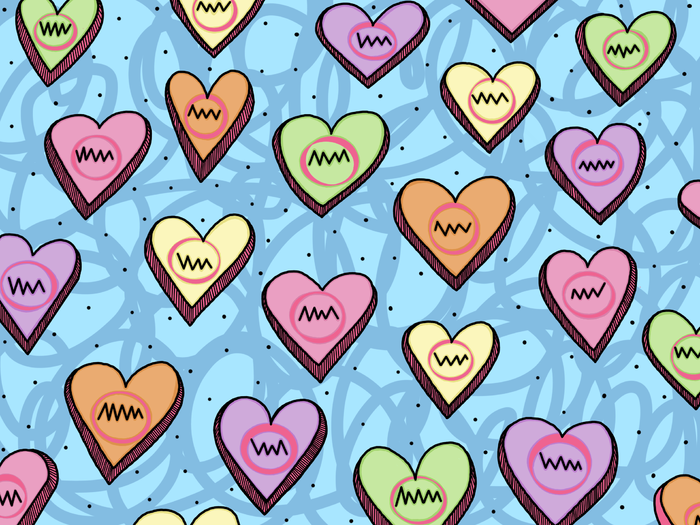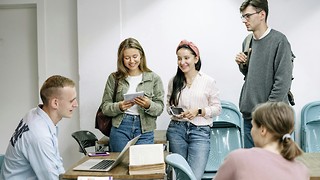“Pleasure is not a dirty topic”: Hannah Witton on sex toys, oversharing, and love in lockdown
Martha French and Lucie Richardson talk online content, what it means to feel sexy, and Valentine’s Day plans with Youtube sensation and sex educator Hannah Witton.

“Schools and teachers are scared of broaching the topic of pleasure, because of the general erotophobia in our society and the myth that talking about sexual pleasure with young people is the same as telling them all to go have lots of sex. Pleasure is not a dirty topic, it’s not a dangerous topic - it should be an integral part of sex education as it’s an integral part of sex,” says Hannah Witton, “Leaving it out of sex ed (the words “pleasure” and “masturbation” don’t appear once in the Department for Education’s RSE guideance) isn’t protecting young people, it’s just perpetuating the same old message of shame”.
Never afraid to engage with the taboo, Witton rose to YouTube fame in the mid 2010s, amassing an impressive and continuously growing following; at present she has over 700,000 subscribers across two channels. Hannah is renowned for honest videos chronicling her life with ulcerative colitis, which required her to undergo an ileostomy - affectionately referred to as ‘Mona the Stoma’.
“Leaving it out of sex ed isn’t protecting young people, it’s just perpetuating the same old message of shame.”
However, her channel is by no means restricted to discussions of disability, featuring videos on everything from sex and relationships to books, finance, and home decor. Witton’s videos are unique in their ability to advise and educate viewers on problems big and small, all the while retaining an accessibility and a conviviality that keeps her audience coming back for more.
One of her most popular projects is the now annual ‘Instagram sex survey’, in which she asks her (largely female, twenty-something) following questions about their experience of and attitudes towards sex and relationships. Of this year’s results, she says “I think there’s been some more openness around solo sex and sex toys as a lot of people aren’t able to have partnered sex because of lockdown rules, and I’ve seen a general curiosity in sex tech as well, how different apps and toys can enhance sexual experiences over long distances”.
Witton has a positive take on the increasing digitization of the dating world, as “it’s fun, it connects you to other people, and if dating was something you enjoyed doing pre-pandemic it’s important to find ways to still do the things we enjoy or find new ways to get the benefits: new experiences, new connections with people”.
“I think there’s been some more openness around solo sex and sex toys as a lot of people aren’t able to have partnered sex because of lockdown rules.”
However, it is not only the pursuit of pleasure that has changed under the pandemic, Hannah sees it as a win for sexual health too: “the last 12 months has given us the language and tools to talk about our health status and getting tested in terms of COVID and I hope that we can translate that to how we talk about sexual health and STIs”. An ambassador for Brook - a national charity which offers sexual health services and education to young people - Witton often creates content designed to encourage her audience to take charge of their own sexual health and wellbeing. Her videos range from destigmatising taboo topics such as STI testing, to informing viewers about the pros and cons of different contraception methods.
Off the back of this Youtube fame, Witton has published two sex-ed style books. The first is Doing It: Let’s Talk About Sex… (2017), an honest and informative guide to understanding and approaching sex and relationships in the 21st century. The second, The Hormone Diaries: The Bloody Truth About Our Periods (2019), combines anecdotes and research to help reader’s tackle the “hormone rollercoaster” that is menstruation.
It is this increasing notoriety not only online but on bookshelves that has led Witton to reconsider her responsibilities and boundaries as an influencer. She admits to being in two minds about the discourse surrounding the obligation to speak up and share: “I used to think it was as simple as if you have a platform then you have a moral responsibility to do good with that - talk about issues, raise awareness, get your audience taking political action. And whilst those things are all still important, I also now think there is more nuance to what “good” is. Do your posts about interior design or music or cooking bring people joy? Great! Joy, fun, and play are just as important as talking about the causes we fight for. I’ve also seen a shift to this pressure and expectation placed on influencers to talk about every bad thing that happens in the world the moment it happens and if you don’t share your “response” in a timely manner then you are a terrible person. Just because someone isn’t sharing something publicly doesn’t mean they don’t care, doesn’t mean they’re not donating, doesn’t mean they’re not learning or taking action.”
Whilst her content is inherently confessional, in recent years Witton has made a conscious effort to separate elements of her day-to-day life from her online presence, most notably in the context of her relationship. However, Witton’s wedding this year brought a series of related content, and most recently she has been documenting her experiences of trying for a baby. Therefore, for Hannah, it remains “a conversation I’m always having with myself - what I’m comfortable sharing and what I’m not. I don’t have any hard lines other than just listening to my gut”.
This no-pressure outlook extends too to her lockdown expectations, for she accepts that the pandemic hasn’t taught her much about herself - “and I think that’s fine! You don’t have to be having massive revelations during lockdown, you can just be the same person you were before”.
Over the years, Witton has gained a thorough understanding of her own relationship with her sexuality and she frequently uses this knowledge to spark discussion or moments of self-discovery with her following. When asked if she had any specific tips or tricks that she uses to help herself feel sexy she responded: “It’ll be different for everyone but I love putting on sexy lingerie - that’s a quick way to get me out of life mindset and into sexy mindset. But I do think we often focus too much on what will make us feel sexy rather than what will help us step out of all the things we’ve been doing and worrying about during the day. What can you do to be able to step out of that to allow the sexy feelings to emerge? It could be as simple as turning your phone off, having an uninterrupted conversation with your partner, having a dance and literally shaking off all the life or work or school thoughts”.
And does Hannah herself have any plans for Valentine’s day this year? “No,” she laughs, “Just a regular Sunday in lockdown”.
 News / Cambridge academics sign open letter criticising research funding changes22 February 2026
News / Cambridge academics sign open letter criticising research funding changes22 February 2026 News / Student and union protesters hold ‘Trans Liberation Solidarity Rally’ 24 February 2026
News / Student and union protesters hold ‘Trans Liberation Solidarity Rally’ 24 February 2026 News / Union speakers condemn ‘hateful’ Katie Hopkins speech14 February 2026
News / Union speakers condemn ‘hateful’ Katie Hopkins speech14 February 2026 Features / Beyond the porters’ lodge: is life better outside college?24 February 2026
Features / Beyond the porters’ lodge: is life better outside college?24 February 2026 Theatre / Footlights Spring Revue? Don’t Mind if I Do!25 February 2026
Theatre / Footlights Spring Revue? Don’t Mind if I Do!25 February 2026








